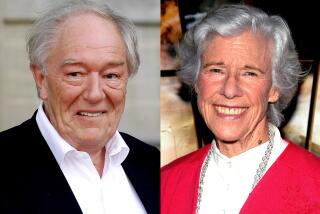Herbert Blau dies at 87; theater director helped shape CalArts
- Share via
Herbert Blau, an influential theater director, theorist and scholar who helped shape CalArts during its early years, died at his home in Seattle on May 3, his 87th birthday. He had cancer, according to the Seattle Times.
The Brooklyn, N.Y.-born professor was a transformational figure who introduced sometimes controversial ideas and new energy into the American regional-theater landscape. He made his first major impact on the national theater scene in the 1950s as co-founder of the daring San Francisco troupe the Actor’s Workshop.
With fellow San Francisco State professor Jules Irving, Blau diverted from the standard commercial stage repertoire of the time and created an ensemble of artists who produced a boundary-pushing array of sophisticated experimental plays by such European authors as Harold Pinter, Jean Genet and Bertolt Brecht, and applied offbeat approaches to classic works.
In a radical move for the time, they also famously staged Samuel Beckett’s “Waiting for Godot” for inmates at San Quentin State Prison in 1957.
“There, at least, was an audience that could find meaning in the play’s apparent meaninglessness, in the seeming plotlessness of the characters’ wait for (perhaps) nothing, and in the nearly uneventful duration of time that is passed in almost solitude,” William Hutchings wrote in 2002 in a World Literature Today review of Blau’s “Sails of the Herring Fleet: Essays on Beckett.”
Though touted by critics, the Actor’s Workshop struggled financially and, in 1965, Blau and Irving left San Francisco to create a resident company at the Vivian Beaumont Theater in New York’s Lincoln Center. His tenure at the Beaumont, which was dedicated to making “theater of loud involvement” with a political and experimental bent, was stormy and brief.
Blau worked at CalArts during a formative period in the school’s existence. He served as provost from 1970 to 1971, when the school opened to students. He also served as dean of the theater and dance school before being forced out in a clash with trustees.
CalArts said on its website that Blau took the lead in designing “a radical educational model” that favored independent artistic work over traditional curricula and less rigid relationships between faculty and students.
The school also credits Blau and its then-President Robert Corrigan for hiring a prestigious and unconventional roster of instructors that included artists John Baldessari, Nam June Paik and Allan Kaprow, musician Ravi Shankar and animator Jules Engel.
Blau, whose 1964 book “The Impossible Theater: A Manifesto,” was widely read by theater artists, went on to other theater companies and academic posts. He most recently served as a professor at the University of Washington, retiring in 2012.
Born in Brooklyn on May 3, 1926, Blau graduated from New York University in 1947 with a bachelor’s degree in chemical engineering. Having written for the school newspaper, he decided to change course and pursue playwriting. He received a fellowship to Stanford University, where he earned a master’s in drama in 1949 and a doctorate in English and American literature in 1954.
Blau is survived by his second wife, Kathleen Woodward, who is director of the Simpson Center for the Humanities at the University of Washington; their daughter; two sons and a daughter from his marriage to Beatrice Manley; seven grandchildren; and three great-grandchildren.
More to Read
Start your day right
Sign up for Essential California for the L.A. Times biggest news, features and recommendations in your inbox six days a week.
You may occasionally receive promotional content from the Los Angeles Times.






